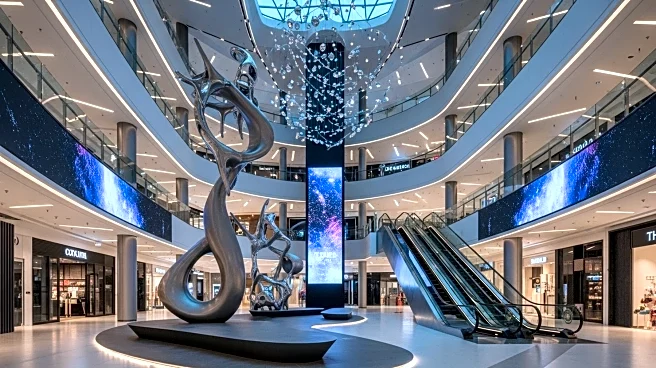What's Happening?
Westquay Shopping Centre in Southampton, England, is undergoing changes to adapt to evolving consumer habits influenced by the rise of online shopping. Originally opened in 2000 as the largest city centre shopping mall in Europe, Westquay has been a significant retail destination. However, with the increasing popularity of online shopping, experts suggest that traditional shopping centres must evolve to remain relevant. The centre, which attracts over 19 million visitors annually, has expanded its offerings beyond retail to include dining and leisure facilities. In 2017, the Westquay South development introduced a leisure hub with a cinema, reflecting a shift towards providing diverse experiences. The centre's director, Andy Jackson, emphasizes the need for shopping centres to offer more than just shopping and dining, incorporating medical retailers and competitive socializing experiences to attract visitors.
Why It's Important?
The transformation of Westquay Shopping Centre highlights a broader trend affecting retail industries globally, including in the U.S. As consumer preferences shift towards online shopping, traditional malls and shopping centres face challenges in maintaining foot traffic and sales. This evolution is crucial for the survival of physical retail spaces, which must innovate to offer unique experiences that cannot be replicated online. The adaptation strategies employed by Westquay, such as expanding leisure and medical services, could serve as a model for U.S. shopping centres seeking to remain competitive. The success of these strategies may influence retail policies and investment decisions, impacting local economies and employment in the retail sector.
What's Next?
Westquay Shopping Centre plans to continue evolving by introducing more diverse offerings to attract visitors. This includes expanding medical retail options and competitive socializing experiences. The centre aims to provide unique experiences that differentiate it from online shopping platforms. As consumer habits continue to change, shopping centres like Westquay will need to innovate continuously to stay relevant. The broader retail industry will likely monitor these developments closely, considering similar adaptations to address the challenges posed by online shopping.
Beyond the Headlines
The shift in consumer habits and the adaptation of shopping centres like Westquay may have long-term implications for urban planning and community development. As shopping centres evolve into multi-functional spaces, they could become central hubs for social interaction and community engagement. This transformation may also influence cultural trends, as shopping centres integrate diverse experiences that cater to various interests and demographics. Additionally, the focus on competitive socializing and medical retail could lead to ethical considerations regarding consumer privacy and data usage in these new environments.









